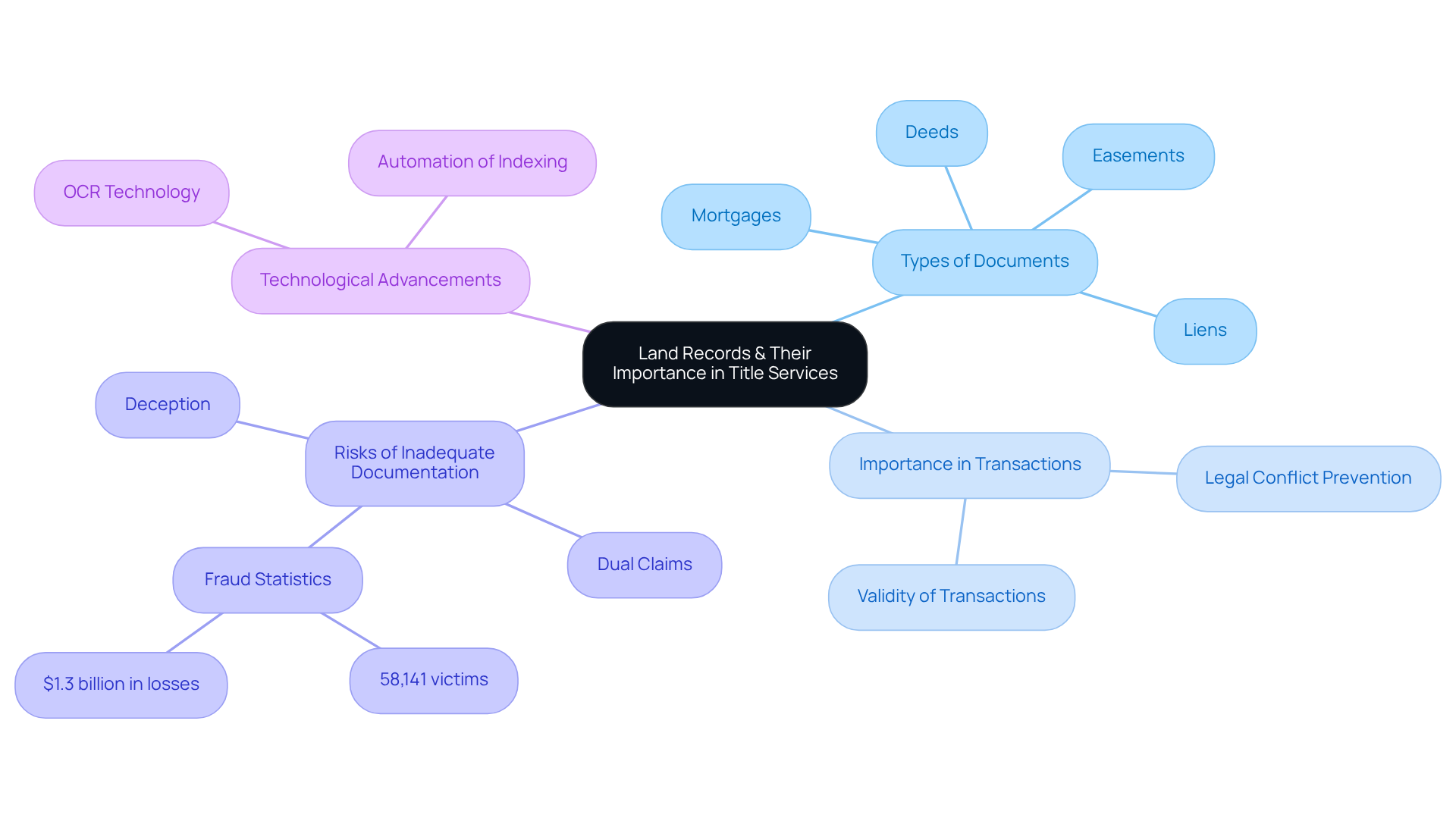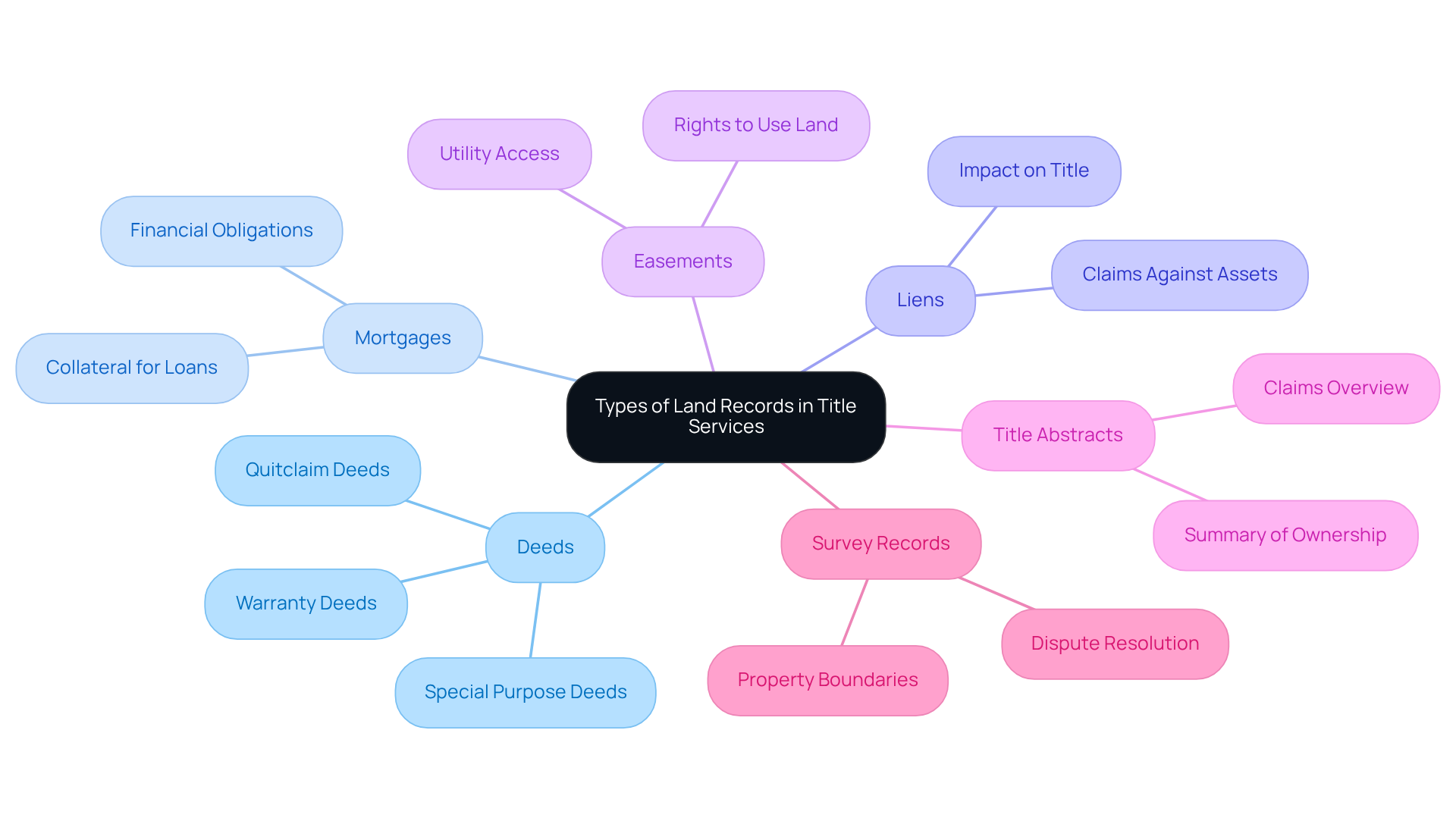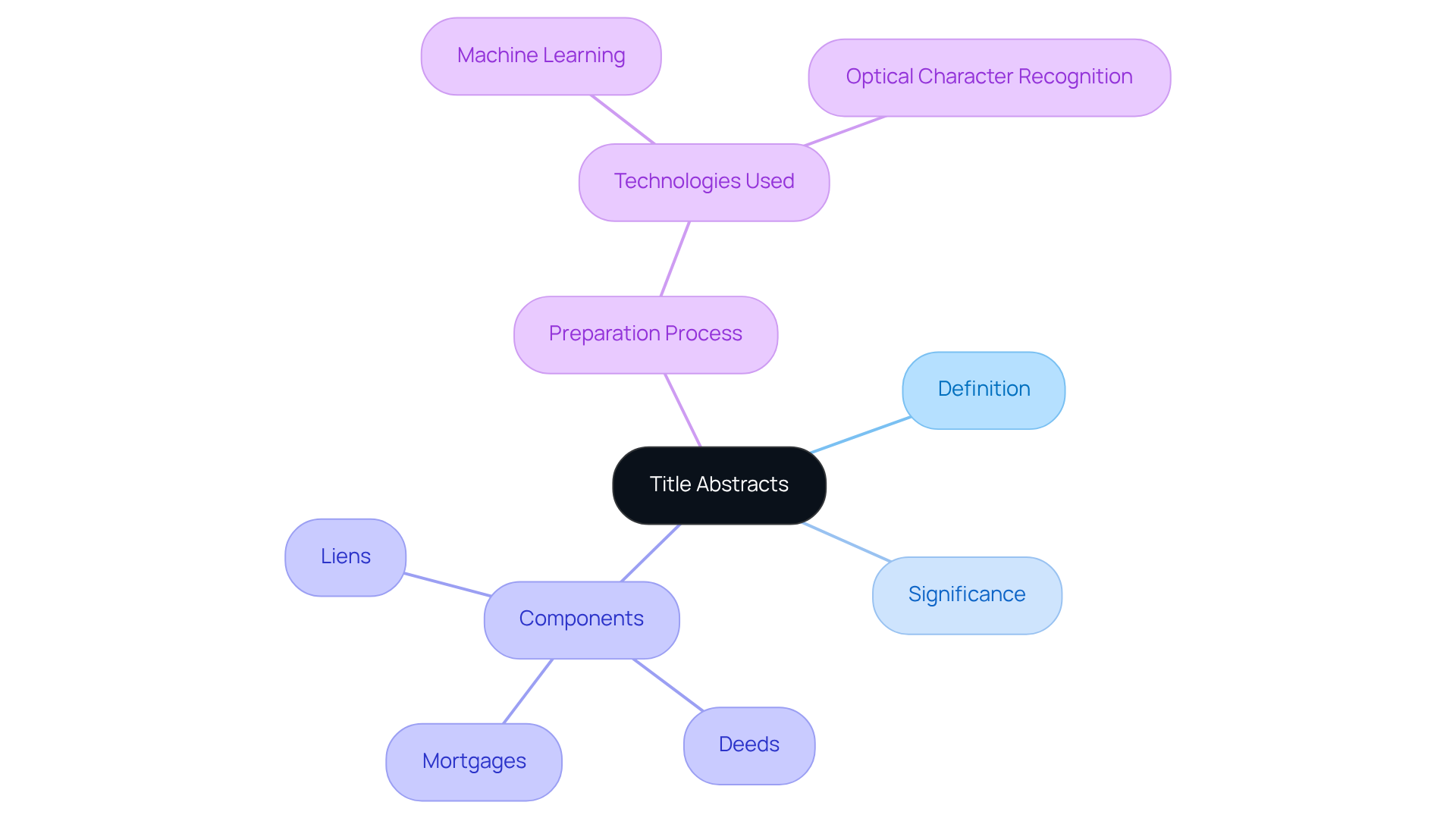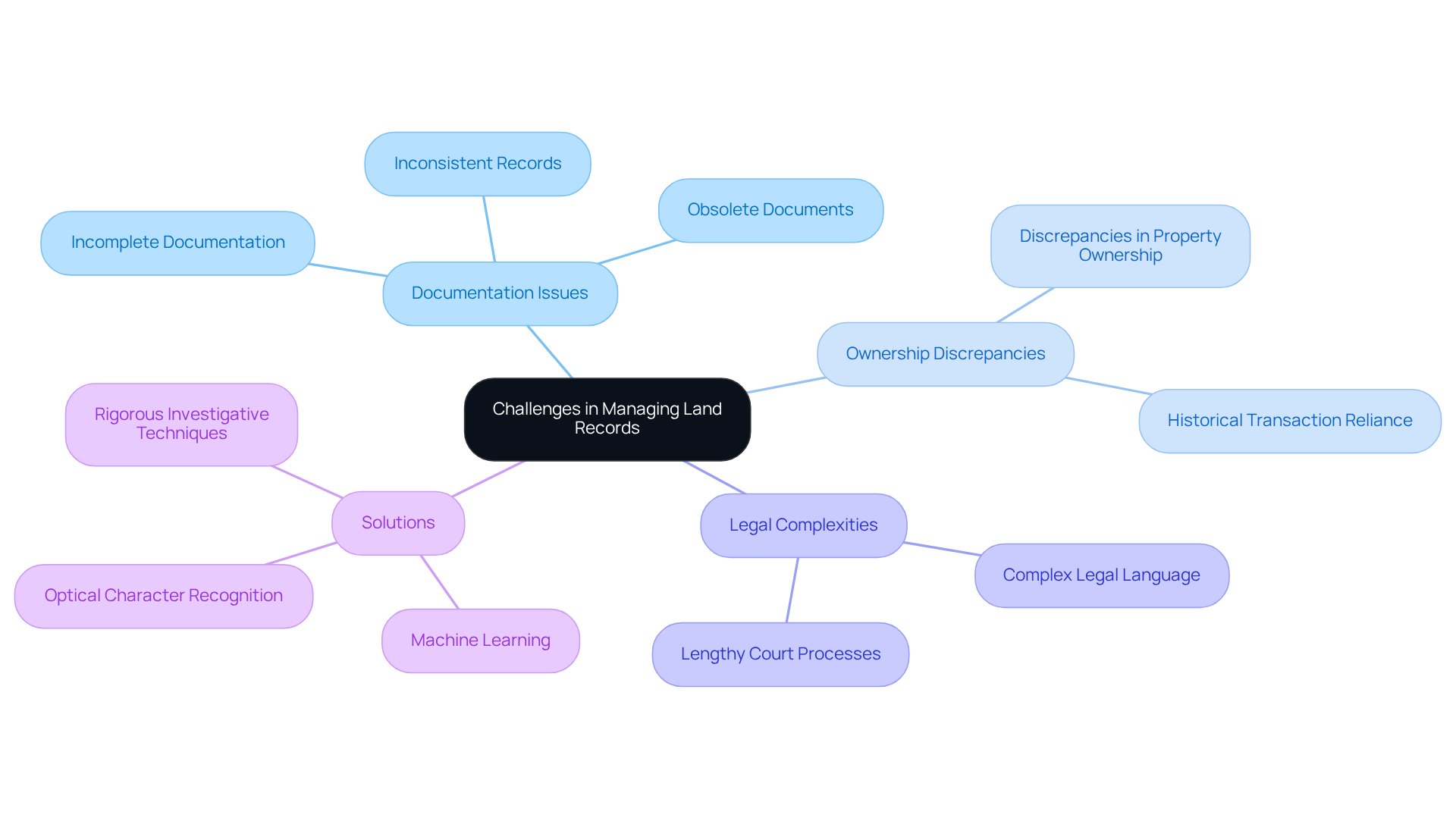Overview
The article underscores the critical importance of various land records utilized in title services, including:
- deeds
- mortgages
- liens
- easements
- title abstracts
- survey records
Each of these elements plays a vital role in validating real estate ownership and rights. Furthermore, it highlights that precise land documentation is essential for mitigating risks associated with real estate transactions. This necessity is underscored by the substantial financial losses incurred due to real estate fraud. In addition, the article emphasizes the integration of advanced technologies to enhance the efficiency and accuracy of managing these records, offering a promising solution to the challenges faced in the industry.
Introduction
Land records serve as the backbone of real estate transactions, functioning as official documentation that validates ownership and rights associated with properties. Understanding the various types of land records—such as deeds, mortgages, and easements—provides invaluable insight into the complexities of title services and the inherent risks of property ownership. Furthermore, as the prevalence of real estate fraud continues to rise, a critical question emerges: how can professionals ensure the accuracy and reliability of these essential documents to safeguard against potential disputes and financial losses?
Define Land Records and Their Importance in Title Services
Land documents serve as official papers that validate real estate rights and interests, encompassing various types such as deeds, mortgages, liens, and easements. Their critical importance within document services establishes the foundation for confirming real estate claims, ensuring transactions are legally valid and devoid of conflicts.
Accurate land documentation is vital for research analysts, as it mitigates risks associated with deception, dual claims, and other legal challenges that may arise during real estate dealings. For instance, the FBI reported that from 2019 to 2023, over 58,141 victims suffered significant financial losses totaling $1.3 billion due to real estate fraud, underscoring the necessity of precise documentation in safeguarding ownership rights.
In the domain of title services, the types of land records used in title services streamline the due diligence process, allowing real estate professionals to verify possession and identify any encumbrances on the asset. As Suze Orman aptly stated, 'Owning a home is a keystone of wealth both financial affluence and emotional security,' which emphasizes the intrinsic value of secure property ownership.
Furthermore, Abraham Lincoln remarked, 'In so far as Government lands can be disposed of, I am in favor of cutting up the wild lands into parcels, so that every poor man may have a home,' highlighting the societal significance of land ownership.
Additionally, case studies illustrate that innovative documentation offices are adopting technologies like optical character recognition (OCR) to enhance the management and accessibility of land files. These tools facilitate the automation of indexing and redaction processes, thereby improving service efficiency and protecting against fraudulent activities.
The absence of precise land documentation can lead to disputes and complications surrounding real estate, further demonstrating the essential role these documents play in transactions.

Explore Different Types of Land Records Used in Title Services
In title services, several types of land records are essential, each serving a unique function:
-
Deeds: These legal documents enable the transfer of real estate title between parties. Different types of deeds, such as warranty deeds, quitclaim deeds, and special purpose deeds, carry distinct implications for the buyer's rights and responsibilities.
-
Mortgages: A mortgage represents a legal agreement where a borrower uses real estate as collateral for a loan. This record is essential for comprehending the financial obligations linked to the asset, influencing both ownership and investment choices.
-
Liens: These are claims against an asset, typically arising from unpaid debts. They can significantly affect the title and must be addressed before any sale can proceed, making them crucial for title researchers.
-
Easements: These records confer specific rights to one party to use another's land for designated purposes, such as utility access. Comprehending easements is essential for assessing land rights and possible limitations.
-
Title Abstracts: Summaries of the possession history and claims against a real estate asset, title abstracts offer a thorough overview of the status, which is crucial for evaluating risks and ensuring clear possession.
-
Survey Records: These documents outline the boundaries and dimensions of a property, which are vital for resolving disputes and ensuring accurate property descriptions.
The types of land records used in title services are essential to the property investigation process, allowing experts to confirm possession, evaluate risks, and guarantee adherence to legal requirements. By utilizing advanced technologies such as machine learning and optical character recognition, platforms like Parse AI enhance the extraction and analysis of these records, significantly boosting the efficiency and precision of service offerings.

The Role of Title Abstracts in Title Services
Title abstracts serve as concise summaries that encapsulate the history of ownership and any claims against an asset. Their significance for property researchers cannot be overstated, as they provide a swift reference to the asset's legal status. A well-prepared document summary integrates details from various property documents, which are types of land records used in title services, including deeds, mortgages, and liens, allowing researchers to identify potential concerns that could impact the transaction.
The preparation of a property summary requires meticulous analysis of the types of land records used in title services, ensuring that all pertinent information is accurately represented. Furthermore, this process can be significantly expedited through advanced technologies such as machine learning and optical character recognition, which Parse AI employs to enhance the efficiency of document research.

Challenges in Managing Land Records
Managing land documentation presents significant challenges that complicate the title research process. Common issues include:
- Incomplete or inconsistent documentation
- Discrepancies in property ownership information
- Complexities of legal language
For instance, obsolete documents may fail to reflect recent transactions, leading to potential disagreements that can escalate into prolonged legal battles. In fact, presumptive titling systems, which rely on historical transaction documentation, account for two-thirds of court cases in India, underscoring the critical need for accurate and current information.
Furthermore, the legal terminology prevalent in land documents can obscure the true status of a property, complicating navigation for professionals. To mitigate these challenges, researchers in this field must employ rigorous investigative techniques and leverage advanced technology. Tools such as machine learning and optical character recognition can significantly enhance the extraction and analysis of land records, streamlining the research process. By embracing these innovations, property researchers can improve the accuracy and efficiency of their services, ultimately benefiting real estate professionals and their clients. This commitment to precision not only diminishes the risk of disputes but also cultivates greater trust in the title research process.

Conclusion
Land records play a pivotal role in title services, serving as the backbone for validating real estate rights and ensuring the integrity of property transactions. These official documents—deeds, mortgages, liens, and easements—are essential for confirming ownership and addressing any encumbrances that may exist. The significance of accurate land documentation cannot be overstated; it directly impacts the security of property ownership and the prevention of fraud.
Throughout this article, various types of land records have been explored, highlighting their specific functions and importance in the title research process.
- Deeds facilitate the transfer of ownership.
- Mortgages outline financial obligations.
- Liens indicate claims against a property.
- Easements establish usage rights.
- Title abstracts provide a comprehensive overview of an asset's history.
- Survey records delineate property boundaries.
Each of these elements contributes to a thorough understanding of real estate, emphasizing the necessity for precise and reliable documentation.
Ultimately, effective management of land records is crucial for mitigating risks and fostering trust in real estate transactions. As technology continues to evolve, embracing tools such as machine learning and optical character recognition can enhance the efficiency and accuracy of land record management. This commitment to innovation not only streamlines the title research process but also reinforces the foundational role that land records play in property ownership. Stakeholders in the real estate industry are encouraged to prioritize the accuracy and completeness of land documentation to safeguard their investments and uphold the integrity of the market.
Frequently Asked Questions
What are land records?
Land records are official documents that validate real estate rights and interests. They include various types such as deeds, mortgages, liens, and easements.
Why are land records important in title services?
Land records are crucial in title services as they confirm real estate claims, ensure transactions are legally valid, and help identify any encumbrances on the property.
How do accurate land documents mitigate risks in real estate?
Accurate land documents help reduce risks associated with deception, dual claims, and other legal challenges that may arise during real estate dealings.
What statistics highlight the necessity of precise land documentation?
From 2019 to 2023, the FBI reported over 58,141 victims of real estate fraud, resulting in significant financial losses totaling $1.3 billion, emphasizing the need for precise documentation to safeguard ownership rights.
How do land records assist real estate professionals?
Land records streamline the due diligence process for real estate professionals, allowing them to verify possession and identify any encumbrances on the asset.
What technologies are being used to improve land documentation management?
Innovative documentation offices are adopting technologies like optical character recognition (OCR) to enhance the management and accessibility of land files, improving service efficiency and protecting against fraud.
What can happen in the absence of precise land documentation?
The absence of precise land documentation can lead to disputes and complications surrounding real estate transactions, highlighting the essential role these documents play.




